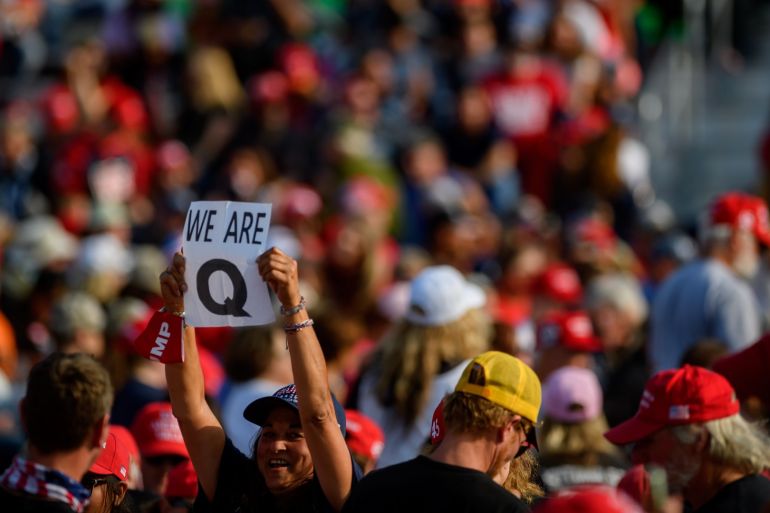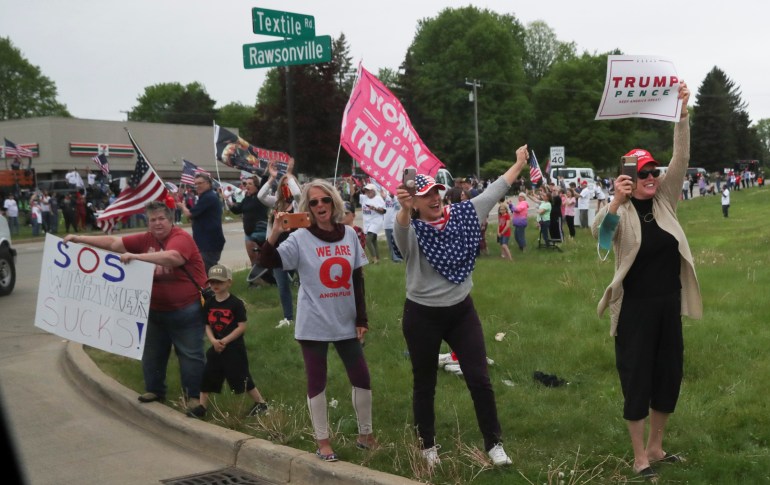In QAnon-linked US candidates, populism meets conspiracy
At least 25 congressional candidates with links to the conspiracy web QAnon will appear on ballots on November 3.

In a batch of QAnon-linked Republican congressional candidates on ballots across the US this general election season, experts see the product of increased polarisation and a new form of conservatism fostered by the conspiracy-theory friendly President Donald Trump.
The web of convoluted conspiracies known as QAnon, which began in 2017 when a shadowy figure known as Q began posting fringe ideas and breadcrumb narratives on sites like 4chan, has gone increasingly viral, although its support offline has been harder to quantify. Researchers say it remains relatively small.
Keep reading
list of 4 items‘Insurrection’ should bar Donald Trump from US presidency, lawyers argue
Ex-Proud Boys leader Joseph Biggs sentenced to 17 years for US Capitol riot
Trump indictments: Key court dates set in Georgia, federal election cases
Still, the imagery, slogans, and call signs of QAnon have become common at campaign rallies for Trump, who is lionised in some versions of the conspiracy web as a saviour sent to uncover a paedaphilia ring perpetrated by US political, and indeed global, elites.
When supporters gathered outside of Walter Reed Medical Center, where Trump was being treated for COVID-19, at least one QAnon sign was present. Trump, for his part, said in August of QAnon supporters: “I understand they like me very much, which I appreciate.”
Pressed on the issue at an October 15 town hall, “I know nothing about QAnon. … I know nothing about it,” Trump said before adding: ”I do know they are very much against paedophilia.”
Meanwhile, the FBI has labelled the collection of fringe theories a possible terrorist threat.

In QAnon, Brian Levin, the director of the Center for the Study of Hate and Extremism at California State University San Bernardino (CSUSB), told Al Jazeera, you have “the visceral appeal of an anti-elite message that is elastic enough to capture a lot of folks who feel fear and disenfranchisement from the current political system”.
The conspiracy, he added, “allows for this ‘wink and nod’ kind of relationship between extreme and mainstream and that’s how candidates are playing it”.
The organisation Media Matters for America identified at least 76 candidates running for national office during the primary season who had some connection, or have paid lip service to, QAnon.
According to the group, 23 Republicans and two third-party candidates with QAnon links have secured places on the ballot for November 3. Nevertheless, the prospect of a QAnon Congressional caucus remains unlikely, as only two candidates who have in the past expressed support for QAnon, or its underlying concepts, are considered likely to win on November 3.
At least one conspiracy theorist has arrived here at Walter Reed. For QAnon believers “Q+” is President Trump. pic.twitter.com/Q3o9JGN4TJ
— Philip Crowther (@PhilipinDC) October 4, 2020
Still, experts say, the number of candidates who have at times ascribed to QAnon, or other conspiracy theories, is directly connected to a president who has regularly railed against “deep state” actors trying to undermine his authority, who promoted several conspiracy theories during his candidacy and presidency, and who has continually demurred when asked to condemn QAnon and other fringe communities.
“Trump has made an opening. He ran against his party, and he ran against the establishment writ large. And he’s created a coalition of supporters who are not normal Republicans, or normal conservatives,” Joseph Uscinski, a professor of political science at the University of Miami who focuses on conspiracy theories, told Al Jazeera. “They are driven by anti-establishment concerns.
“Populism meshes with conspiracy theories very well,” he added. “Populism is about evil elites who are corrupt working against the people. And that’s exactly what conspiracy theories like QAnon address.”
QAnon and Congress
Of the current group of candidates, the most likely to attain national office is Marjorie Taylor Greene, who is running unopposed in a deep-red district of Georgia for an open House seat.
Trump tweeted his congratulations to Greene following her primary win, calling her a “future Republican star”.
Congratulations to future Republican Star Marjorie Taylor Greene on a big Congressional primary win in Georgia against a very tough and smart opponent. Marjorie is strong on everything and never gives up – a real WINNER!
— Donald J. Trump (@realDonaldTrump) August 12, 2020
In late 2017, Greene posted a video online in which she repeatedly called Q a “patriot”, saying ”many of the things that he has given clues about and talked about on other forums and 4chan, have really proven to be true”.
“There’s a once-in-a-lifetime opportunity to take this global cabal of Satan-worshipping paedophiles out, and I think we have the president to do it,” she says later in the video.
In August, after winning the primary, Greene sought to distance herself from QAnon in an interview with Fox News, saying the conspiracy theory was not “part of my campaign” and something she has not “talked about for quite a long time now”.
Lauren Boebert, a Colorado restaurant owner who upset five-term incumbent Representative Scott Tipton in the Republican primary and is favourite to win on November 3, has also sought to distance herself from QAnon. Her campaign has said she does not support conspiracy theories.
During the primary, Boebert had appeared on an online show hosted by a QAnon believer, and said she was “very familiar” with QAnon.
“Everything that I’ve heard of Q, I hope that this is real, because it only means America is getting stronger and better, and people are returning to conservative values, and that’s what I am for,” she said in the interview.
We can now add Lauren Boebert to the ever-growing list of QAnon supporters who are running for Congress. https://t.co/VJbFGkYKLx pic.twitter.com/m1bklAfikp
— Right Wing Watch (@RightWingWatch) May 18, 2020
Candidates running in longshot elections, often in Democratic bastions, have been more explicit with their support. Jo Rae Perkins, who is challenging Democratic Senator Jeff Merkley, declared after winning the Republican nomination: “I stand with Q and the team.” Mike Cargile, a Republican running for Congress in California, has a QAnon slogan in his Twitter profile. Other candidates have posted references on social media, have appeared on QAnon-affiliated shows, or have been photographed in QAnon regalia.
Adam Enders, a professor of political science at the University of Louisville who focuses on conspiracy theory in politics, said that QAnon is relatively opaque, with some supporters buying into its general ethos without ascribing wholesale to its more unhinged narratives.
Like the Tea Party
He noted it remains unclear which candidates are true believers and which dabble in QAnon rhetoric to tap into its cultural significance in a portion of society.
“I think there’s some parallel with the Tea Party here,” he told Al Jazeera, referencing a conservative movement that began in 2009, tapped into a specific mix of libertarian ideals and right-wing populism, and saw several of its candidates elected to Congress.
“In hindsight, we look back at the Tea Party and think, well, it’s not really a party. It was really just sort of a brand of conservatism. And it was Republicans tapping into a sentiment,” he said. “[The current situation] is candidates recognising that there are these types of sentiments out in the mass public, and thinking that they can grow their coalition, just by a tiny little bit, by signalling here and there.”
However, he noted that the messaging of the most extreme adherents to the Tea Party paled in comparison to the claims made by QAnon’s supporters, adding: “Culture changes and polarisation has been increasing. So in some sense, you need something perhaps that’s more outlandish to actually capture attention.”
‘Wake-up call’
While it remains unlikely that the current QAnon-linked candidates will have a significant effect on policy, CSUSB’s Levin said their appearance on ballots across the country should be a “wake-up call”.
“I think the problem with this has been the lack of leadership in the Republican Party, with respect to really using all the means that they have to eliminate conspiracy theories and bigotry from their discourse,” said Levin.
While some Republicans in Congress have called on the president to clearly condemn QAnon, a coordinated response has been a non-starter.
One Republican, Representative Adam Kinzinger, posted a tweet in August calling the theories a “fabrication”, only to be rebuked by a senior Trump campaign staffer.
When will @RepKinzinger condemn the Steele Dossier fabrications and conspiracy theories pushed by Democrats? That actually WAS Russian propaganda. https://t.co/NzVjbkkk8l
— Matt Wolking (Text TRUMP to 88022) (@MattWolking) August 12, 2020
Meanwhile, the Republican Party in Texas in July, according to the New York Times, released a new slogan lifted directly from QAnon: “We are the storm”.
In September, the House Republican campaign arm falsely accused Democratic Representative Tom Malinowsky of lobbying to protect sexual predators, which prompted death threats from QAnon supporters, according to the newspaper.
When the House passed a resolution in early October condemning QAnon, 17 Republicans and one independent voted against it.
Levin warned the mixed signalling may embolden some of the most fringe supporters.
“If we have people who are willing to fall hook, line and sinker for this ridiculous train of conspiracy theories,” he said, “how do you think the most unstable, angry and violent people among us are going to conduct themselves as the political season as well as other societal stressors, become more inflamed?”
He added: “QAnon is shifting from being an outlier to a bit of a bellwether of the fragmented, conspiratorial and bigoted politics that await us.”
